The Manodarpan cell undertook a survey of school students to analyse the perceptions of students on issues impacting their mental health whose results were released. A total of 3.79 lakh students took part in this survey from KVs, JNVs, State Government schools & private schools.
One of the many things that are rarely focussed on in the education system is mental health and its importance. The ever-growing competition and the constant fear of failure puts children under immense pressure, both from their peers and society. Though this issue is not limited to only children, it assumes greater importance in their case as children being in their prime age, keeping them in the right frame of mind is immensely important.
Successive governments emphasized on the quantity more than the quality of the education system. Indicators like enrolment ratios, school and teacher rationalization, learning outcomes, and similar other quantitative performance parameters were given weight over qualitative parameters. As a result, there are no periodic reports & studies that capture the mental health and well-being of the students. In the absence of any such data, it is nearly impossible to design policies targeting this area.
In light of this, the New Education Policy (NEP) 2020 focuses on the mental health and well-being of the students. It highlights the pressing need for ensuring effective cognitive development coupled with developing holistic and well-rounded individuals. ‘Manodarpan’, an initiative of the Ministry of Education (MoE) as a part of Atmanirbhar Bharat Abhiyan is aimed at offering psychosocial help to students, instructors and families for intellectual fitness and emotional health for the duration of the instances of COVID-19 and beyond.
The Manodarpan cell undertook a survey of school students to analyse the perceptions of students on issues impacting their mental health. In today’s story, we look at the ‘Mental Health and Well-being of School Students’ survey of 2022, conducted by the Manodarpan cell.
A brief about the Survey
Before analysing any survey, it is important to look at the survey design. This includes the sampling size, the methodology adopted, and the limitations of the survey.
The respondents of this particular survey are from different schools across the country, at the middle and secondary stages of education. A total of 3,79,842 students took part in this study, of which 1,58,581 were from the middle stage (VI-VIII), and 2,21,261 were from the secondary stage of education (IX-XII). In terms of the type of school, Kendriya Vidyalayas and Jawahar Navodaya Vidyalayas accounted for more than 2 Lakh schools out of the 3.79 Lakh schools selected for this survey. Both genders participated nearly equally in this study, each accounting for approximately half of the sample size. Eleven transgenders also took part in this study.
The survey was done using a self-reporting online questionnaire (Google form) to be filled out by the students, and the participation is voluntary. As there is still a stigma attached to mental health, the privacy of the individual was taken care of. Being online mode, it provided students with minimal interference to freely express their views.
In terms of limitation, the survey presents the data of only those who were willing to participate. There is no adequate data on whether this ‘voluntary’ participation is also a ‘prior informed consent’. Since the mode of the survey is also online, there is an absence of scope of interaction with the respondents. Further, online surveys are only filled out by computer literates and people who are concerned about the issue. The surveys also do not present the extent of bias and the motives of the respondents, including whether it is representative enough.
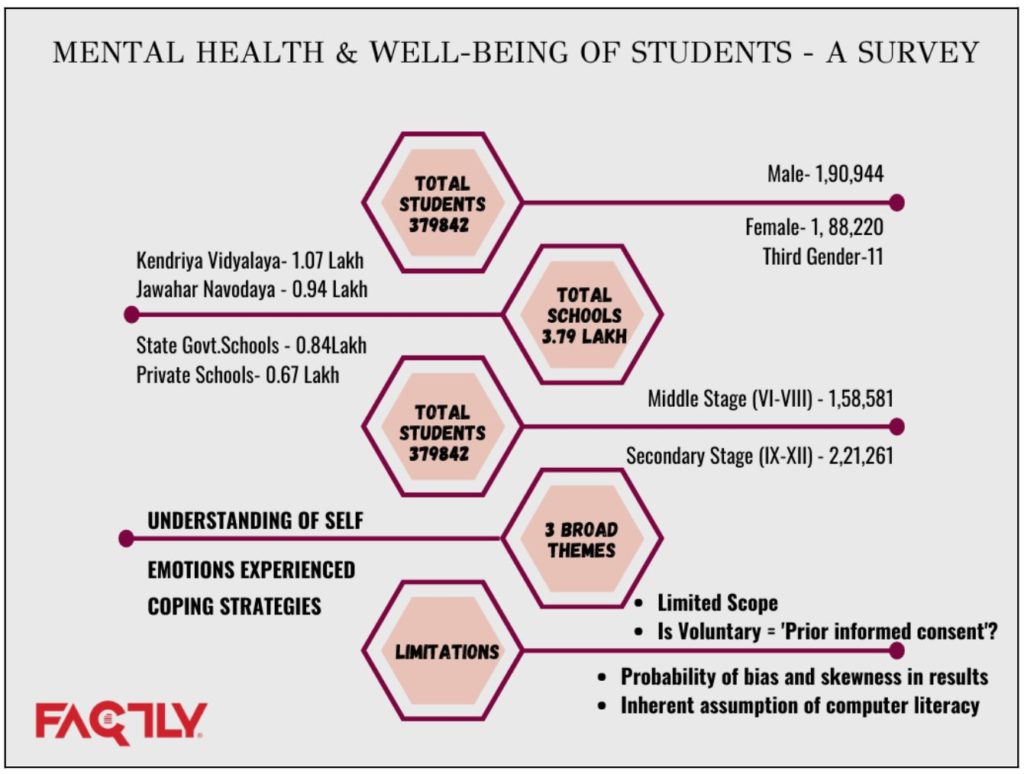
Three broad themes covered
As mentioned earlier, the survey covered three broad themes:
- Students understanding of self
| Of one’s own self | Oneself in social context |
| Adaptability – ability to adapt quickly | Happiness |
| Trusting others | Being a leader – Teachers believing them to lead |
| Satisfaction – school and personal life | Trustworthiness |
| Responsibility of doing well in life | Peer Pressure – doing things to please friends |
| Body image – confidence on appearance | Academic Perceptions |
| Confidence – no hesitation to ask |
- Emotions experienced
- Coping Strategies
Key highlights – overview of the results
The overall results show that students are satisfied with their school experience and feel responsible for doing well in life. Most students believe they are reliable and do not hesitate to ask for social support, which is an important safeguard for mental health. The results of the survey also highlight that students most frequently experience happiness, followed by anxiety. More than 58% reported having people with whom they can share and discuss their feelings and nearly half of the respondents preferred sharing with friends as a coping strategy. Nearly one-fourth chose yoga and meditation as a preferred coping strategy, while another quarter felt that changing the thought process is an ideal strategy.
Around half of them reported to being able to understand others and respond accordingly, thereby showing emotional understanding. For most students, their academics are reported to be causing them anxiety. Students also find it challenging and uneasy to ask questions and engage in conversation with others.
As students progressed from middle to secondary school, there was a noticeable decline in their confidence in their body image, satisfaction with school and personal life, and availability of people to share their feelings. Students in secondary school, on the other hand, reported a higher level of anxiety about their studies, exams, and results.
On the impact of COVID-19, 43% of respondents reported facing no difficulties at home since the outbreak of COVID-19. Around forty percent experienced mood swings, while 27% reported not feeling any extreme emotions at all. Around forty percent reported a change in their sleeping patterns due to COVID-19. Around half of them reported difficulty in learning content online, while forty percent reported technical/network issues during online learning.
School type and results across themes:
School environments play an important role in influencing the mental health of students. A positive and healthy school climate can positively influence the behaviour, emotional and social development of children. Accordingly, the survey provides results of the broad themes across four major school types in India- Kendriya Vidyalayas (KVs), Jawahar Navodaya Vidyalayas (JNVs), State Government schools (SGS), and Private Schools (PS).
On Understanding oneself
Among the four school types, the majority of private school students expressed adaptability, and more confidence while lagging behind others in the rest of the themes like confidence in body image, trusting others, satisfaction in both school and personal life. A greater percentage of students from Government schools reported trusting others and confidence in body image, i.e., physical appearance.
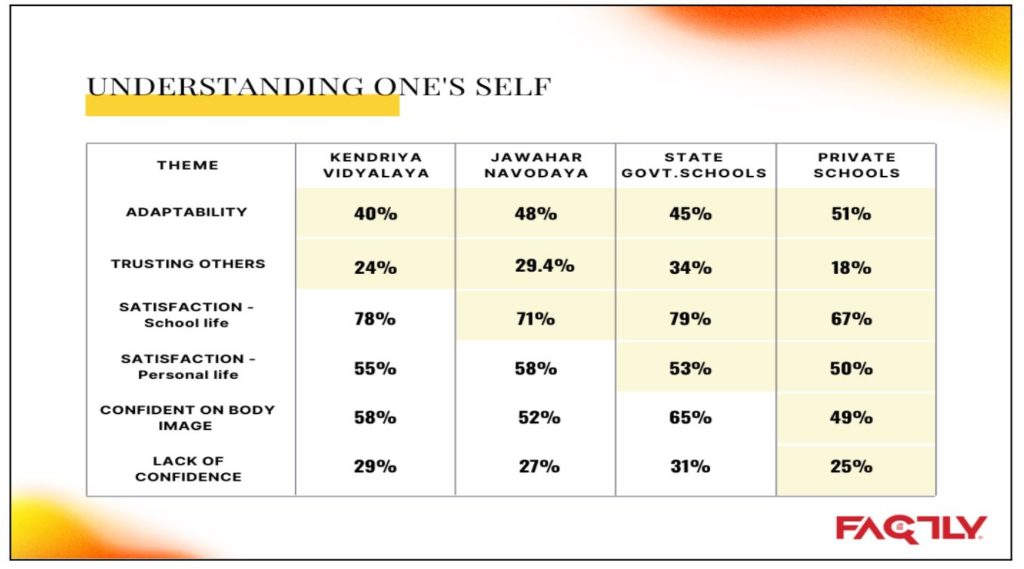
On Understanding oneself in social context
In the social context, private school students responded feeling happier than the rest. KVs topped in the trustworthiness, while state government schools scored higher in teachers believing in students leading others, and satisfaction at academics. Students from the government schools also believed that doing well in studies is important for people to respect them, and most of them felt anxious about their studies.
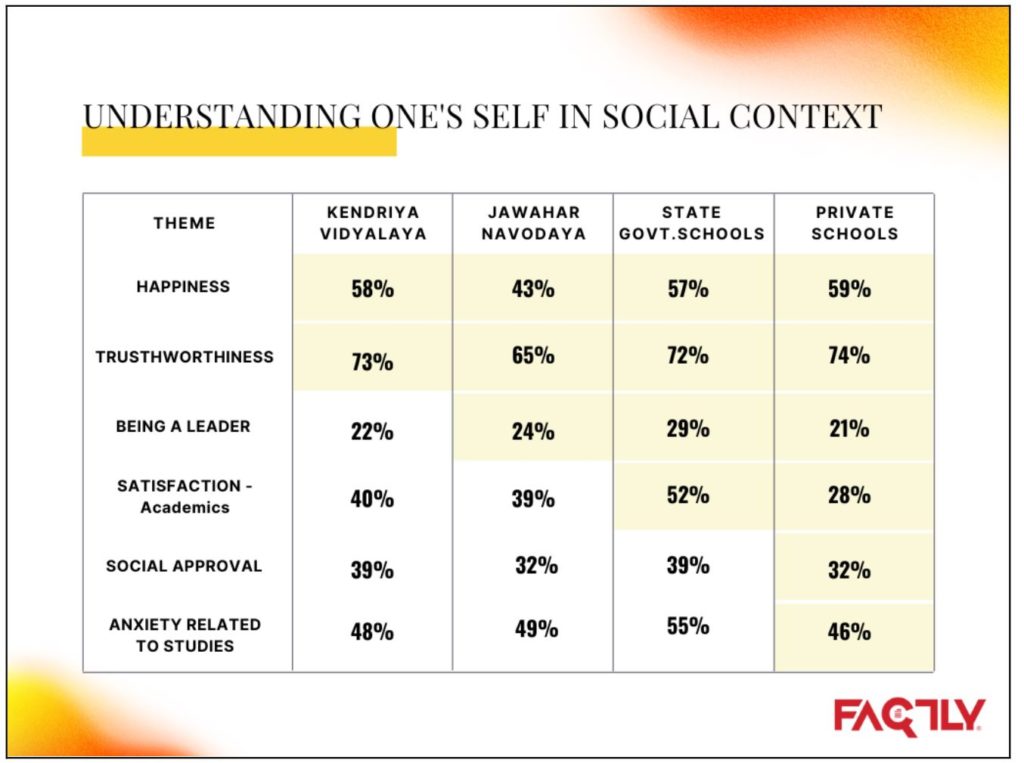
On emotions expressed
The majority of students from state government schools expressed that they always took good self-care and have emotional understanding- the ability to understand the feelings of others and express their feelings accordingly. Among other schools, a high percentage of students from government schools experienced difficulties due to COVID-19 and reported difficulty in learning online. And a majority of them also reported not losing hope in stressful situations.
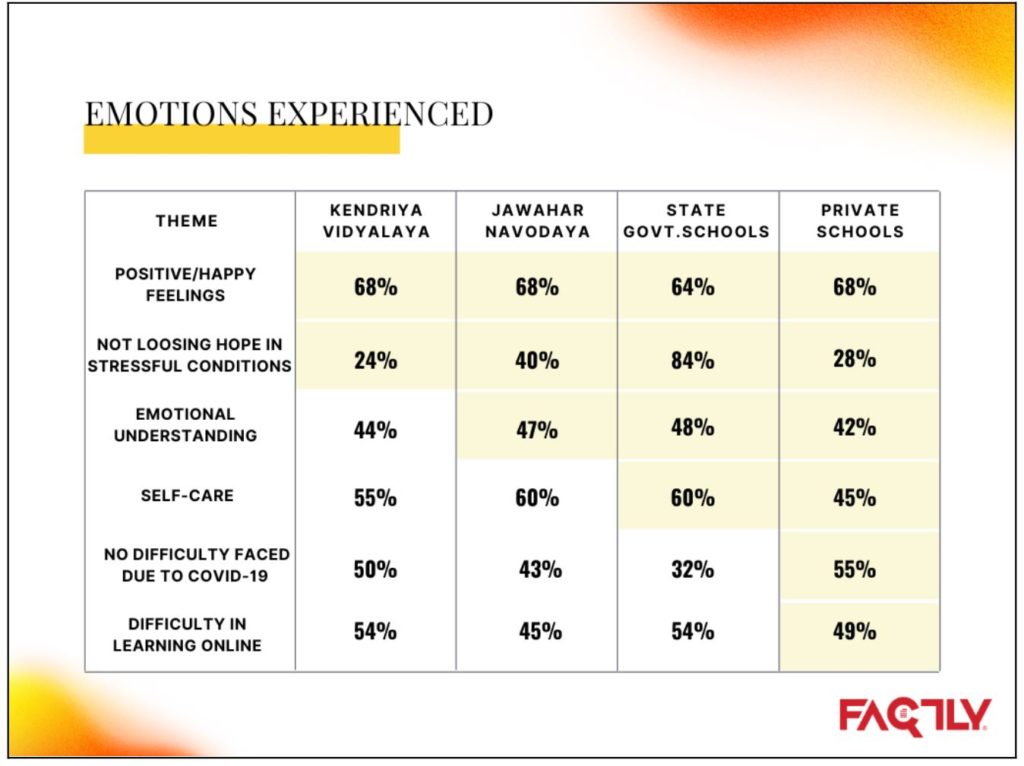
On Coping Strategy
In the coping strategy, students from private schools preferred sharing with teachers to sharing with friends, while those from JNVs overwhelmingly preferred friends over teachers. Students from JNVs also reported higher self-efficacy (ability to solve challenging tasks), while private schools reported the lowest. Yoga and meditation as a coping strategy is least preferred in private schools, with a majority of them reporting ‘changing how one feels and thinks as the best strategy.’
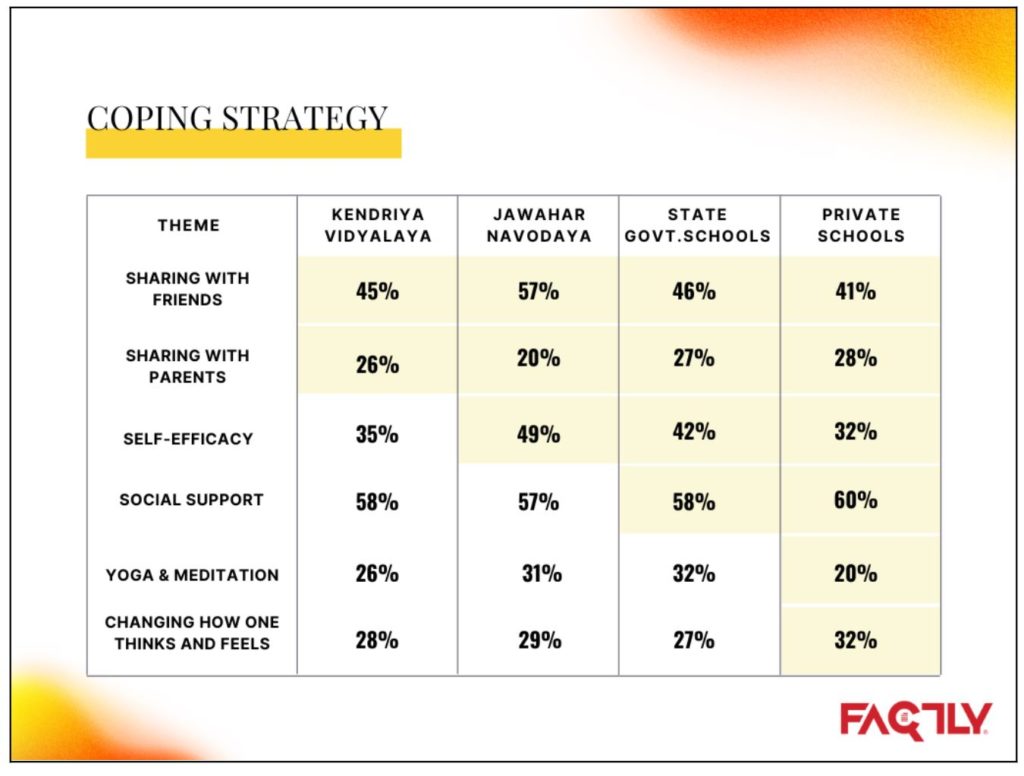
Emotional Literacy is the way forward
The survey demonstrated a few areas where students across the schools responded positively: seeking support from friends, satisfaction with school life, trustworthiness, and yoga and meditation as a coping strategy. However, frequent mood swings and anxiety related to academics is a worrisome trends. Also, as students transition from middle to secondary stages, there is a decline in confidence in body image, and satisfaction-both in school and in personal life. These feelings are common for both males and females. This calls for a need for proactive measures to support and strengthen the socio-emotional aspects of education. Some recommendations made in this regard are
• Adequately preparing teachers for the emotional well-being of their students.
• Emotional literacy should be a key focus and should be integrated into all aspects of the school’s functioning.
• Schools must create enabling conditions for care, empathy, and inclusive practices. A significant overhaul is required in schools’ overall ethos, & practices of interpersonal interactions within the school.
Featured Image: Mental Health and Well-being of School Students


